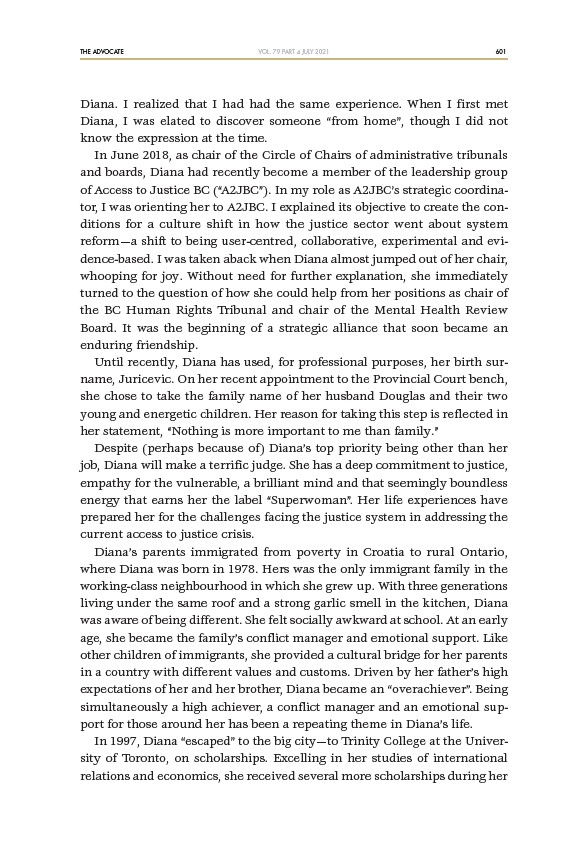
THE ADVOCATE 601
VOL. 79 PART 4 JULY 2021
Diana. I realized that I had had the same experience. When I first met
Diana, I was elated to discover someone “from home”, though I did not
know the expression at the time.
In June 2018, as chair of the Circle of Chairs of administrative tribunals
and boards, Diana had recently become a member of the leadership group
of Access to Justice BC (“A2JBC”). In my role as A2JBC’s strategic coordinator,
I was orienting her to A2JBC. I explained its objective to create the conditions
for a culture shift in how the justice sector went about system
reform—a shift to being user-centred, collaborative, experimental and evidence
based. I was taken aback when Diana almost jumped out of her chair,
whooping for joy. Without need for further explanation, she immediately
turned to the question of how she could help from her positions as chair of
the BC Human Rights Tribunal and chair of the Mental Health Review
Board. It was the beginning of a strategic alliance that soon became an
enduring friendship.
Until recently, Diana has used, for professional purposes, her birth surname,
Juricevic. On her recent appointment to the Provincial Court bench,
she chose to take the family name of her husband Douglas and their two
young and energetic children. Her reason for taking this step is reflected in
her statement, “Nothing is more important to me than family.”
Despite (perhaps because of) Diana’s top priority being other than her
job, Diana will make a terrific judge. She has a deep commitment to justice,
empathy for the vulnerable, a brilliant mind and that seemingly boundless
energy that earns her the label “Superwoman”. Her life experiences have
prepared her for the challenges facing the justice system in addressing the
current access to justice crisis.
Diana’s parents immigrated from poverty in Croatia to rural Ontario,
where Diana was born in 1978. Hers was the only immigrant family in the
working-class neighbourhood in which she grew up. With three generations
living under the same roof and a strong garlic smell in the kitchen, Diana
was aware of being different. She felt socially awkward at school. At an early
age, she became the family’s conflict manager and emotional support. Like
other children of immigrants, she provided a cultural bridge for her parents
in a country with different values and customs. Driven by her father’s high
expectations of her and her brother, Diana became an “overachiever”. Being
simultaneously a high achiever, a conflict manager and an emotional support
for those around her has been a repeating theme in Diana’s life.
In 1997, Diana “escaped” to the big city—to Trinity College at the University
of Toronto, on scholarships. Excelling in her studies of international
relations and economics, she received several more scholarships during her